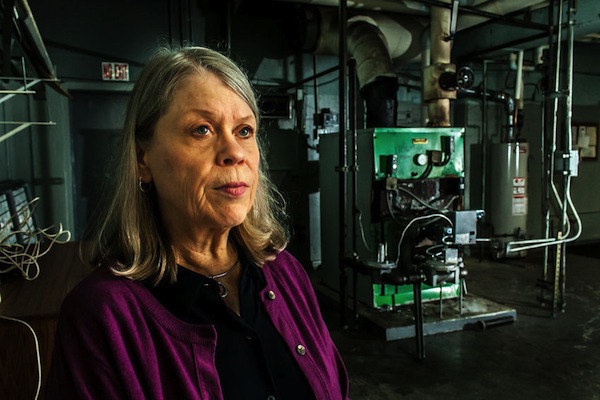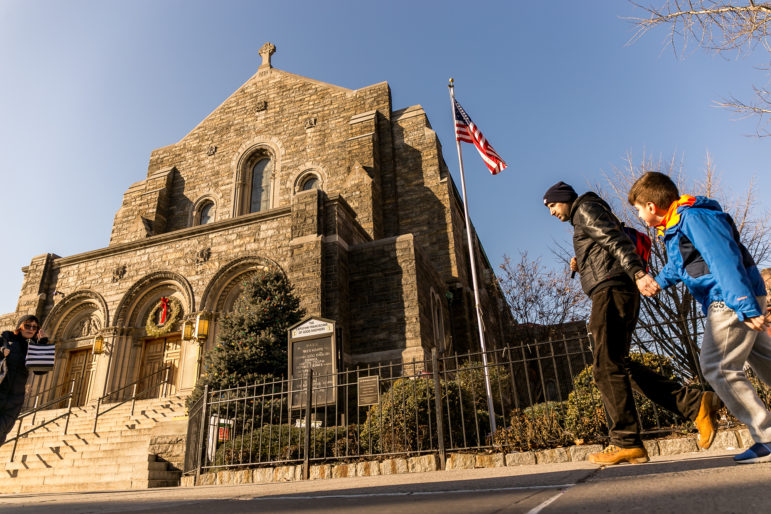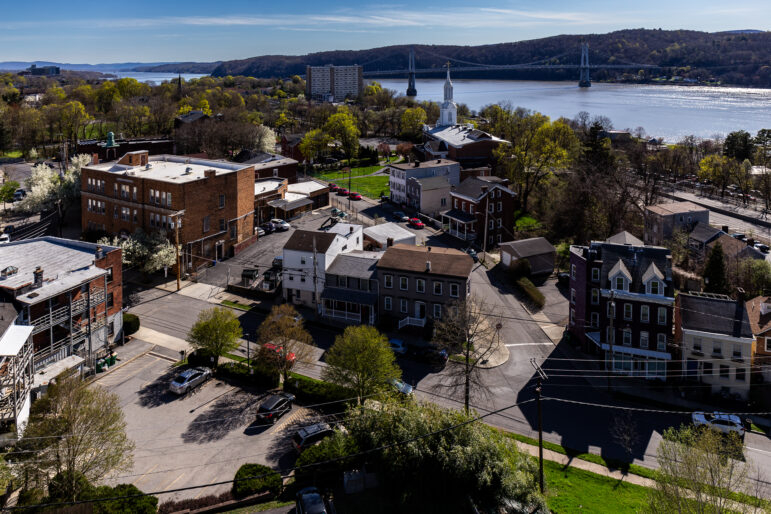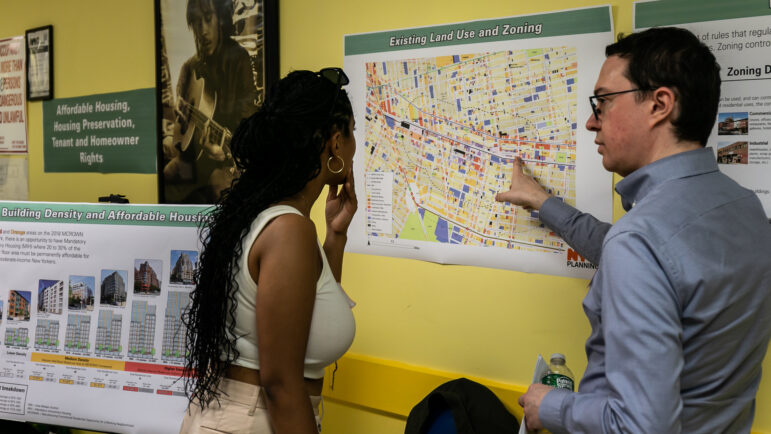
Photo by: Adi Talwar
Susan Asis, supervisor of Brooklyn’s New Lots branch library, with the building’s boiler. It’s recently been repaired, but the fix is temporary; rust means the unit will break again.
Even in a typical year, capital project plans for the city’s libraries exist in a state of flux, the spreadsheets detailing them continually updated as library administrators piece together funds from elected officials for repairs and upgrades, work with design and construction officials through a churn of studies, designs, RFPs and bids, and juggle long-term plans for branch renovations with emergency needs like a suddenly ailing HVAC.
But this year’s outlook for library capital projects has been especially dynamic. Last Wednesday the New York Public Library scrapped its widely-criticized plan to overhaul its flagship building at 42nd Street and said it would renovate, not sell, its Mid-Manhattan branch. Late last month, the city’s Department of Design and Construction, which oversees the bulk of library projects, put $20 million in pending reimbursements for work done under the library’s supervision under review in response to FBI and city Department of Investigations probes into how library president Thomas Galante spent money on recent renovations at the Queens Central Library. City Comptroller Scott Stringer announced earlier this year that he is auditing all three city library systems with an eye to how millions of taxpayer dollars have been used for capital projects.
Meanwhile Mayor de Blasio’s capital budget, issued Thursday, indicated support for tackling maintenance needs, with a proposed $548.8 million over five years to fund projects at the city’s more than 200 branch libraries. (Another $24 million is allocated for NYPL’s research libraries, bringing the total to $573 million, according to the mayor’s Office of Management and Budget.)
After years of budget cuts under Mayor Bloomberg, the new administration’s apparent alignment with City Council members on the importance of libraries has also raised the possibility that the competitive and discretionary process by which capital funds are allocated might be reformed in favor of a more stable funding stream.
One hundred seventy-one capital projects are currently underway, ranging from installation of fire alarm systems to branch renovations, says David Resnick, Deputy Commissioner for Public Buildings at the Department of Design and Construction. One hundred projects have been completed in the past five years.
Breakdowns in Brooklyn
The mayor’s spending proposal gives Brooklyn a total of $93 million over five years, with most of that coming in FY14 and FY15. BPL officials say its sixty buildings need a total of some $300 million in repair (roughly $68 million of that at its Central Library), and presented the mayor’s office with a list of its most urgent priorities – including $82 million in emergency maintenance projects – earlier this year, according to Brett Robinson, executive vice president of finance and administration.
At the New Lots branch in East New York, recent rain and leaky roof flashing have sent water pouring into the stairwells. During the coldest days of January and February, the branch was forced to close for a total of nearly two weeks when its 57-year old boiler failed and temperatures inside the branch dropped to 60 degrees, according to library supervisor Susan Asis. (Union rules require closure at 65 degrees; staff may take a personal day off or work at another branch.)
“We have a lot of customers who depend on the library for various reasons” – job-seekers without computer or Internet access at home, residents of nearby shelters, children waiting after school until their parents return from work – “and they had to go somewhere else,” Asis says.
An improvised effort to reroute the HVAC system helped to warm the branch’s Adult Literacy Center on an upper floor, but recent testing in preparation for summer showed that “whatever they did to get the HVAC through the roof, now they’re having trouble getting the air conditioning to work,” she says.
BPL has struggled for years to get adequate funding for capital projects, saying it has had, on average, $15 million a year to address maintenance needs. In the competitive and discretionary funding process for capital projects, Brooklyn has not fared as well as the Queens or New York systems.
Each year the library systems must present city officials with their request for capital funds, asking for administration money but also pitching projects to Council members in an effort to get their support for repairs or renovations at branches in their districts. BPL’s budget woes are “always in the back of anybody’s mind” when building problems arise, Asis says. Repairs can be postponed for years, and “you can’t always do anything about it.”
BPL’s February assessment of the system’s capital needs found the roofs of nearly half of its libraries need repair or complete replacement. Nearly half of branches need new furniture or equipment, and half need new or repaired boilers.
BPL executive vice president for external affairs David Woloch sees this year as a turning point.
“One of the things we’ve been trying to do this year is a better job of articulating our needs” to elected officials, Woloch says. “Generally we’ve had good dialogues with everybody and I think the extent of our capital needs is resonating a bit more.”
But most of the money was already committed to library projects and includes just $1.5 million in new funds, BPL says.
“The current capital allocation maintains the initial down payment the City has provided towards preserving and improving our buildings. However, it is our hope that the City’s final budget will increase library funding, an investment that will allow us to bring our buildings into a state of good repair and provide all of Brooklyn’s residents the library spaces and services they deserve,” says Robinson.
One sale cancelled, another still on
However Woloch says the library still plans to move ahead with the sale and redevelopment of its Brooklyn Heights branch, which has been touted as a plan to raised tens of millions for capital projects at other branches. BPL plans to select a developer for the project in June, Woloch says.
Still, NYPL’s course reversal on its Central Library plan—which came amid intense pressure from opponents, including de Blasio—suggests the Brooklyn Heights project could also change direction.
In his campaign last year, de Blasio urged the Brooklyn Public Library not to rush the sale of public land to private developers, but to undertake a thorough, independent review and “ensure we are driving the hardest bargain possible and maximizing the public’s return on the land.” Many of the opponents of the NYPL Central Plan have also fought the Brooklyn Heights sale and proposed redevelopment.
One major upgrade Brooklyn Public Library won’t have to pay for is improved Internet service at its branches, Robinson says. The library negotiated a deal with Verizon to install fiber optic cable at all its branches within the next two years. Currently just three branches have fiber service, while the rest rely on slower broadband connections that are straining under the recent tripling of wifi use at the branches.
“There’s a construction component to running fiber into the branch,” says Robinson, but Verizon agreed to cover its installation costs; monthly service fees will be paid from the library’s operating budget.
Indeed, library capital projects are being developed partly in response to record-high demand for library programs and facilities. NYPL requested $158 million this year to fund renovations, repairs and upgrades, including several capital projects related to its new “out of school time” pilot programs. De Blasio’s budget calls for giving the system – branch and research libraries both – about $312 million over five years, according to the mayor’s Office of Management and Budget.
Queens Public Library requested $292 million in unprioritized capital projects – a multi-year wish list that includes new branch buildings and tasks like replacing windows, doors, and fixing roofs, says Joanne King, the library’s spokeswoman. Last week’s spending plan proposes giving Queens $168 million, according to OMB.
A new day for libraries?
The supportive stance of the new mayor’s office toward libraries – including proposed increases of over twenty percent to the systems’ operating budgets–has also raised the possibility of reform in the funding process for capital projects. Councilman Costa Constantinides, chair of the city council’s sub-committee on libraries, says that while his first priority for this year’s budget is providing operating funds to keep branches open six days a week, he thinks the city needs to tackle how to make capital funding steadier.
“Really there needs to be a larger conversation down the line on how the mayoralty and the Council can fund the capital projects,” he says, with baselining capital funds in the budget as one option to consider. “We’re definitely strongly pushing for six days a week – that’s my firm focus now – but over time, we need to have a discussion over how to get these dollars in.”
But as the New Lots experience this winter shows, maintenance troubles can close branches regardless of the scheduled hours.
Constantinides says the controversy surrounding Galante “isn’t helpful,” but adds, “there’s a distinction between the library systems and the person running it.”
“I think all my colleagues understand how important libraries are – that they are community hubs, that their role has changed. Not to fill your capital needs because of controversy that’s happening, that would be throwing the baby out with the bathwater.”
Correction: Because of a reporting error in a related story, an earlier version of this article incorrectly reported that Mayor de Blasio’s budget calls for major increases in operating funds for libraries. We regret the error.
Clarification: This story cited figures on the amount of capital funds for libraries in the proposed budget from two sources, the mayor’s Office of Management and Budget and an initial analysis from the Independent Budget Office, a publicly funded agency that provides nonpartisan information on the city budget. Those numbers differ slightly for reasons that could not be immediately determined. The story text has been edited to use only the numbers from OMB. The story has also been edited to clarify that money in the proposed budget for BPL would go to projects already in progress.








